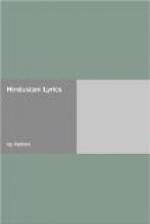The poets from whose work the lyrics in this book have been selected were mostly writers of voluminous Diwans, and they occupied various and diverse stations in life. Some were Rulers, some soldiers, some darweshes (devotees), some men of letters only. The name given is in each case the takhallus (pen-name); each has some special significance, as Sauda, the folly of love, Momin, the believer, Zafar, the victorious; and frequently this name is introduced, by way of signature, into the closing stanza of a poem.
ABRU: born at Lucknow, lived at Delhi, was a darwesh of the Order of Kalenders, and wrote an Urdu Diwan much appreciated for the ingenious allegories in which it abounds.
Amir: Amir Minai of Rampur, one of the best poets of the latest period: a great mystical poet: his Qasidahs for Muhammad are sung by devotees: Court poet of Rampur: travelled to Mecca and Medina, and, after the death of his patron, Nawab Kalbe Ali Khan, came to Hyderabad on hearing of the Nizam’s fame and interest in poetry: rival of Dagh, by whose side he lies buried in Hyderabad.
Arzu: a poet of Gwalior, where he held an important Government post in the days of Shah Alam II. (r. 1759-1806). He wrote his poems mostly in Persian, and was the author of a Dictionary of Mystical words.
Asif: pen-name of H.H. Mir Mahbub Ali Khan, Nizam of Hyderabad, who died in 1911: pupil of the poet Dagh (q.v.) and was an esteemed poet, and patron of poets.
Dagh: a court poet of Rampur: went to Hyderabad and became the teacher of the Nizam in poetry (see Asif): lived there in great honour as Poet Laureate, and was given the title of Fasih-ul-Mulk (the eloquence of the nation): his poetry is described as natural and graceful in expression: his proficiency was so great that no poet could stand against him in the Mushaira: he was of extraordinary wit.
FIGHAN: of Delhi: was the foster-brother of the Emperor Ahmad Shah (r. 1748-1754) and was one of the principal officers at the Imperial Court: famous for his piquant and witty conversation, and greatly skilled in jeux de mots, at which he spent his days and nights.
Ghalib: came of a distinguished Turk family of Samarkand: wrote in Persian as well as in Urdu, and held the position of Poet Laureate at the Court of Bahadur Shah (r. 1837-1857) the last Mogul Emperor.
HALI: a modern poet: pupil of Ghalib: recently dead: greatly admired, chiefly by the Muslims, for his poems calling for Muslim and Indian renascence. He received from the British Government the title of Shams-ul-ulema.
Hasan: Mir Shulam Hasan, born at Delhi: passed his youth in Faizabad and then came to Lucknow to join the literary circle there: was as handsome in person as in mind, and his verse is still popular.
Hatim: one of the early poets: born about 1700, he lived till near the end of the century: a soldier by profession, but in his old age renounced the world and became a darwesh: his cell was near the gate of the Imperial Palace, and many persons resorted to him for counsel.




